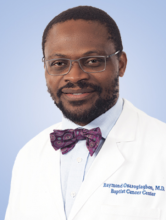Linda Wenger
lwenger@LUNGevity.org
(973) 449-3214
Kimberly Alexander
Kimberly.alexander@bmhcc.org
(901) 830-6880

WASHINGTON, DC (September 8, 2021) — LUNGevity Foundation, the nation’s leading lung cancer-focused nonprofit organization, is pleased to name Raymond U. Osarogiagbon, MBBS, FACP, as its next Community Champion honoree. The program, part of the organization’s Health Equity and Diversity Initiatives, regularly honors leaders whose work defines best practices in supporting people with lung cancer in at-risk communities.
Dr. Osarogiagbon serves as the Chief Scientist for Baptist Memorial Health Care as well as Director of the Multidisciplinary Thoracic Oncology Program and the Thoracic Oncology Research (ThOR) Group at Baptist Cancer Center in Memphis, Tennessee.
During his tenure at Baptist Memorial Health Care, he has overseen the successful growth of Baptist’s lung cancer initiatives, targeting communities across Arkansas, Mississippi, and Tennessee. These efforts include a tobacco control program and low-dose CT lung cancer screenings, with the ultimate goal of reducing lung cancer mortality in the Mid-South.
“Dr. Osarogiagbon’s leadership and research have helped to redefine how we address inequities in lung cancer care and delivery – particularly in communities affected by the intersection of socioeconomic and policy drivers,” explains Jeanne Regnante, LUNGevity’s Chief Health Equity and Diversity Officer.
In addition to his role at Baptist, Dr. Osarogiagbon is a Research Professor at Vanderbilt University and is a Research Member of the Vanderbilt Ingram Cancer Center. He is also the 2021 Dana Farber Cancer Institute Slotnick Memorial Lecturer. A member of the LUNGevity Health Equity Council, Dr. Osarogiagbon sits on several committees, including the External Advisory Board of the Druckenmiller Center for Lung Cancer Research at Memorial Sloan Kettering Cancer Center as well as the Board of Directors of the Hope Foundation for Cancer Research.
About LUNGevity Foundation
LUNGevity Foundation is the nation’s leading lung cancer organization focused on improving outcomes for people with lung cancer through research, policy initiatives, education, support, and engagement for patients, survivors, and caregivers. LUNGevity seeks to make an immediate impact on quality of life and survivorship for everyone touched by the disease—while promoting health equity by addressing disparities throughout the care continuum. LUNGevity works tirelessly to advance research into early detection and more effective treatments, provide information and educational tools to empower patients and their caregivers, promote impactful public policy initiatives, and amplify the patient voice through research and engagement. The organization provides an active community for patients and survivors—and those who help them live longer and better lives.
Comprehensive resources include a medically vetted and patient-centric website, a toll-free HELPLine for support, the International Lung Cancer Survivorship Conference, and an easy-to-use Clinical Trial Finder, among other tools. All of these programs are to achieve our vision—a world where no one dies of lung cancer. LUNGevity Foundation is proud to be a four-star Charity Navigator organization.
Please visit www.LUNGevity.org to learn more.
About Baptist Memorial Health Care
Baptist Memorial Health Care is one of the country’s largest not-for-profit health care systems and the largest provider of Medicaid in the region. Baptist offers a full continuum of care to communities throughout the Mid-South and consistently ranks among the top integrated health care networks in the nation. The health care system comprises 22 affiliate hospitals in West Tennessee, Mississippi, and East Arkansas; more than 5,400 affiliated physicians; Baptist Medical Group, a multispecialty physician group with more than 800 providers; home, hospice, and psychiatric care; minor medical centers and clinics; a network of surgery, rehabilitation, and other outpatient centers; and an education system highlighted by Baptist Health Sciences University (formerly Baptist College of Health Sciences). The Baptist system employs more than 19,000 people and in fiscal year 2019 contributed more than $336 million in community benefit and uncompensated care to the communities it serves. For more information, please visit www.baptistonline.org or follow us on Facebook or Twitter.
About Baptist Cancer Center
Baptist Cancer Center provides world-class cancer care close to home throughout Baptist Memorial Health Care’s three-state service area of Arkansas, Mississippi, and Tennessee. The center takes an interdisciplinary approach to patient care and offers treatment, research, support services, community education, and the area's first genetic counseling and testing program for cancer. BCC has the Mid-South's first adult myelosuppression unit, and in 2019, BCC was awarded a second multimillion dollar research grant from the National Cancer Institute and was distinguished as a site to spearhead clinical research on disparities in cancer care under NCI’s Community Oncology Research Program, known as NCORP. For more information, please visit baptistcancercenter.com or follow us on Facebook.
About Lung Cancer in the US
- About 1 in 16 Americans will be diagnosed with lung cancer in their lifetime.
- More than 235,000 people in the US will be diagnosed with lung cancer this year.
- About 60%-65% of all new lung cancer diagnoses are among people who have never smoked or are former smokers.
- Lung cancer takes more lives than the next three leading cancers (colorectal, breast, and prostate) combined.
- Only 22% of all people diagnosed with lung cancer will survive 5 years or more, BUT if it’s caught before it spreads, the chance of 5-year survival improves dramatically.
